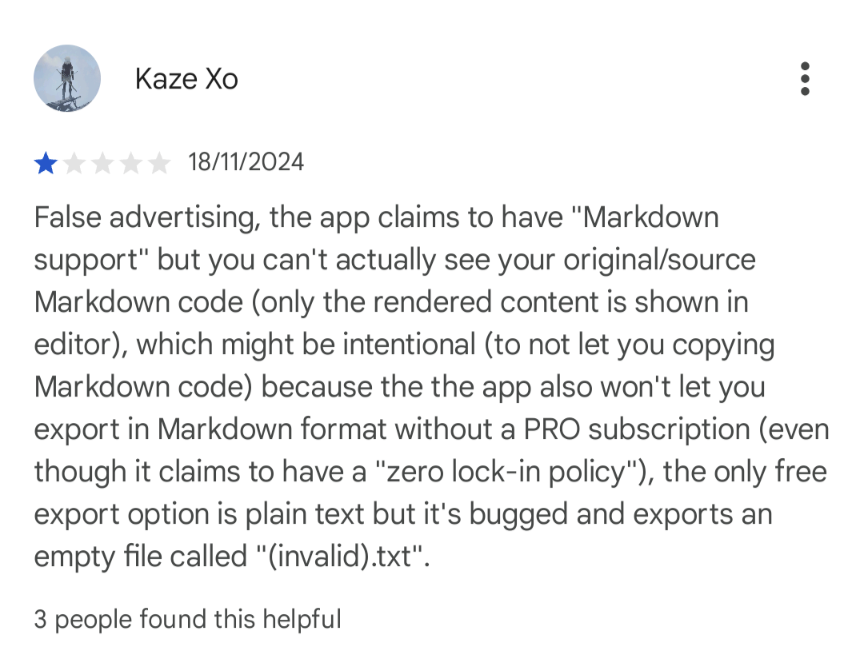I don’t necessarily like a few takes in the comments here.
Vibes wise the Obsidian team seems to be great and they don’t seem to have shown any reason why I should distrust them. I love FOSS but gifting others my work doesn’t put food on my table, so in that sense they need to have a lucrative business model which they seem to have established.
I could use SyncThing, Git or other solutions to do synchronisation between my devices but I choose to buy their Sync offer, since I want to support them (they also have EU servers, which need to be GDPR compliant by law afaik).
The closest comparison I could make is NextCloud. NextCloud open sources their software, but they sell convenience. Sure, you could self host it, but paying them to do so for you may be more attractive. In comparison Obsidian is not really complicated to set up or maintain. It’s literally just a MD-editor. So the only convenient thing to sell is synchronisation if you don’t want to put a price tag on the software.
If they open source all their code, some tech wizard will implement a self hosted obsidian sync server with the same convenience as theirs in a day, and the company will lose their revenue stream.
We’ve all been burned by tech bros in one way or another, but I think it’s ok for people to profit off of their IP. And they seem to be doing so with a positive vision. Feel free to let me eat my words if they ever go rogue, but that’s my 2 cents.
Thanks for the rare, rational comment regarding Obsidian. Many people here seem to think releasing software as closed source automatically means you have something to hide; seemingly forgetting we live in a capitalist system in which you must constantly sell your services to survive. (I am saying this as someone who adores FOSS and donates to most of my homelab software on a regular basis).
I think a more productive way to look at is: is the closed source dev friendly (or at least non-hostile) to the open source community? In the case of Obsidian, they haven’t done anything egregious, and regularly contribute to open source plugins. Furthermore, the notes are stored as markdown files. This gives the user strong resistance against potential enshittification, so even if they did go rogue you can just move to some other text editor lol. Granted, you would miss out on plugins but otherwise that’s a good reason to keep your plugin usage light and plan your Obsidian vault accordingly.
it’s ok for people to profit off of their IP
Absolutely. I just have trust issues with closed source software and platforms. Burned too many times.
I think it’s ok for people to profit off of their IP
I absolutely agree. That doesn’t mean the software has to be closed source though, a lot of software works well when sold with paid support, especially to companies.
If the price is low enough, companies will often just pay even if they don’t need the support.
That’s a bit naive imho. Remaining closed source is a form of IP protection and that’s really ok for what Obsidian is (a markdown editor). There’s just not any benefit for them other than appreciation from FOSS enthusiasts. Also maintaining an open source repository causes a higher workload and they lose a lot of freedom.
If privacy is your concern you don’t need source code anyway. It’s quite easy to sandbox an application like that and analyse network traffic and such. Also Obsidian is built using Electron. That means with enough motivation one could quite easily reverse engineer most of the app. Most of the applications behaviour can also be observed via the integrated dev console, which lets you view source code.
In short I don’t really see the need, unless I want to build or maintain it myself. And I think the negatives far outweigh the positives from the perspective of Obsidians team.
You don’t need a public repo to be FOSS. You don’t need to accept changes. All you need is to provide a copy of the source code upon request. You can even automate that with a link to a tarball or something in the app.
My concern is less about privacy and more about security and longevity (i.e. what happens if they turn evil?). If it’s FOSS, I can audit the source and fork it if they go in a direction I don’t like. If it’s proprietary, I’m SOL if they turn evil or stop development. Projects like these tend to die.
I don’t really see any negatives here. The chance that someone makes a more popular fork is incredibly low, and the chance that someone audits it and points out a bug is a lot higher. They can retain control of the name, sell the software, etc. I really don’t see how providing source code is a downside.
I guess we just have to agree to disagree then. Which is fine.
Your points are valid and thank you for detailing them for me. If I was in their shoes making others able to steal my IP, even if they’re not allowed due to licensing and having to deal with constant scrutiny of the source code are k.o.-criteria, which hinder the project and lead to potential revenue loss.
And it’s totally fair to run your project however you choose. My point is just that FOSS doesn’t automatically mean you can’t make money, tons of businesses are built on a FOSS-first basis. Pick the model that works for your business, and I sincerely hope you find a way to make FOSS part of it.
As I’ve said. Nextcloud is a great example of FOSS working out for a business, haha.
If they open source all their code, some tech wizard will implement a self hosted obsidian sync server with the same convenience as theirs in a day, and the company will lose their revenue stream
Obsidian is storing everything as plaintext files. Those convenient selfhosted sync solutions have been out there for years.
It’s not just about syncing files. It’s also the fact I can edit stuff on my tablet and see the changes in almost real time on my laptop with Obsidian Sync. I believe most other solutions wouldn’t play nice with such a workflow.
With the vault stored on a synchronized cloud drive, Proton/Google/etc the same thing happens.
Then that’s a moot point I guess, haha.
Still a great way to pay for Obsidian to support the development though.
Yeah I agree, hopefully it’s a rare non-evil entity that just wants to make a revenue off convenience and quality rather than some batshit shareholder nightmare monetization garbage.
Well said.
I use this as a backup in tandem with the official sync
And the official one works every time, remotely-save just fails randomly and I need to dig through the logs to see what happened this time
One thing that keeps me really calm about obsidian is the plaintext database. I can live with a proprietary db if the code is foss and I can fudge my data out if I need to. If code and db are proprietary, I’m not putting my data there if I can help it.
Someone develops logseq which is completely foss and like obsidian. Now I can choose to donate to FOSS or buy closed source. How do you decide?
We just need to establish paying for open source software more.
I couldn’t get work to pay for it so I found a better, cheaper alternative, Notesnook. It’s open source (client and sync server), you can publish notes, and it’s end-to-end encrypted.
It says it’s free, but then there’s a pricing and plans page?

A lot of alarm bells ringing for me about that app.
Notesnook is free. It is developed under gpl https://github.com/streetwriters/notesnook
i use notally for quick notes and reminders but i needed another organizer for longer text
i started trying notesnook after reading your comment and it looks like what i needed. I really like its customizability. I wish there was an option to choose fonts from file.
The only problem is that constant login reminder. Is there a way to get rid of it?
I’ve never seen constant login reminders, but I’ve only used it in a browser, and the Android/Window/Linux apps are you seeing it on iOS? Maybe its a bug? If you go to settings in the app and then click “Help and support” > “Report an issue” you can open a github issue. I’ve had really good success in getting issues resolved.
The community plugin “Google Drive Sync” is free, open source, and lets you (clunkily but effectively) bypass Obsydian Sync. One less server to manage.
Which is a great workaround but then all your private notes are on Google’s servers, accessible to anyone with enough admin rights on their end. All apps should be end-to-end encrypted going into 2025. There’s no reason security AND privacy shouldn’t be included.
Just use Joplin. It checks all those boxes, it’s only flaw is being an electron application.
I use it too, but it doesn’t have something like canvas. You have to write them in Mermaid markdown like a caveman.
I just wanted to toss out another thanks for mentioning Notesnook. After a week I’m completely won over.
deleted by creator
Now that it’s free, are its users the product?
Nothing else is changing. No account required, no ads, no tracking, no strings attached. Your data remains fully in your control, stored locally in plain text Markdown files. All features are available to you for free without limits.
“…until we have a large enough userbase to start monetizing and enshittifying…”
At least if/when that happens all your files are in markdown, owned and controlled by you so migrating to another tool is pretty easy.
While that’s technically possible, it’s very difficult, and in my opinion, highly unlikely.
- All notes are stored in markdown, which is compatible with any other markdown-compatible app. It’s not just a note format, it’s a fire exit.
- Even the canvas files are now having an interoperable format created, with other industry-leading canvas style software, and that whole process was started by the Obsidian team voluntarily
- All plugins must be open-source unless explicitly and clearly stated, and such plugins are only listed on a case-by-case basis, which makes even additional plugin-specific functionality added to Obsidian easier to port over to other software if Obsidian ever does lock things down
- They don’t have VC investors, and have mentioned a few times that they won’t be accepting investment in the future, since they don’t exactly have very high costs. They’re explicitly anti “VCware.” Features like Sync that depend on their server hosting bill being paid are only used by paying users, and most users will never have to use Obsidian servers past downloading and updating the app, and installing a few plugins of a few megabytes in size. Costs aren’t likely to rise in any substantial way, and their team is small enough to make it profitable to operate at their existing scale.
- Actions like this are literally proactively recognizing that something wasn’t in line with their manifesto, and wasn’t beneficial for users, so they’re removing it. Companies planning to enshittify don’t usually remove enshittified/negative features they already have before re-enshittifying. They want you used to the enshittification from the start.
They have a plenty large enough user base and have not done so. You’re literally commenting this on a post of them doing the exact opposite. The fear mongering is insane.
It was nothing personal, more of an off-handed commentary on how things usually end up going after 20 years of seeing literally every site/service I’ve used and most of the companies I once considered “the good ones” eventually get shittier in some way when the business side puts on the squeeze.
The one exception I can think of is Wikipedia.
But I don’t have any reason to think badly of these folks, their current owners seem to have their hearts in the right place and indeed have made decisions that avoid lockin and assure users, and I hope they are another Wikipedia that will endure the tides of enshittification.
But I will never again assume that such hopes will remain the reality, even in this case. This is a snapshot in time. Owners change, priorities change, pricing models change, file formats change, common sense statements of basic decency like “don’t be evil” get rescinded, scrappy fun websites created by free-thinkers become tools of fascist oppression.
That doesn’t mean they don’t deserve your business and support currently. Just make sure your off-ramp options remain acceptable if things begin to change.
What’s the catch?
If you want to sync your notes between devices, Obsidian Sync is $48 a year. But since it’s all just markdown files anyway, you could just use dropbox to sync them anyway.
dam thats a lot for a sync. I guess its supporting the project.
It’s $4 a month for 1GB of storage, not insane
I mean, that is an absolutely batshit insane price for storage. Backblaze is $6 per month for 1TB, and Hetzner is 4€ per month for 1TB, so literally 1000x cheaper, but you are also paying for development and the sync software.
I almost have my company going on putting our QMS wiki on obsidian because excalidraw with clickable objects works so nicely and it can visualize our process, but for some reason commercial was showing up as 50 USD per month per user, so they couldn’t justify getting licenses but now it is showing up as 50 USD per year which is way way way more reasonable.
Still closed source.
Seems they’ll just keep making money on sync.
Doesn’t appear so but there is that potential in a future update as they’re in control of what the software actually does. If data is indeed stored in plain text files then hopefully an alternative software could be made to display that data.
Obsidian files are just Markdown, so there is plenty of software out there today that can parse them. The only thing you might miss is plugins that don’t exist outisd of obsidian.
The canvas built in is the easiest UI I’ve used to make mind maps, I’d surely miss it if I had to migrate.
Fwiw, they’ve open sourced the specification behind canvas, so there’s a good chance any OSS Obsidian “forks” that pop up if they do enshittify will be able to support it.
Here’s the same Obsidian Canvas document open in Obsidian, and Hi-Canvas: (*just realized the last connection is missing, that was user error while taking the screenshot, disregard)


They’re not fully cross compatible, but as another user mentioned, the open source spec being worked on is picking up steam as the Open Canvas Working Group (OCWG) and even larger industry canvas platforms are trying to make the format something they can easily import and export in that open format.
So hopefully you won’t have to worry about migration much longer :)
Essentially, just a giant W.
Read whole page. Not sure what Obsidian even is?
Note-taking app. Each note is a markdown file, so you can add formatting.
A very successful one with a large extension ecosystem to boot.
What sort of extensions would one use for a note taking app? What sort of notes to you take with it?
There’s lots of types, think even stuff like d&d monster blocks, or custom date ones
I use mermaid and git extensions personally.
Lots of AI bros add LLMs to it but that’s not my cup of tea
The Dataview plugin is the most critical one. You can create queries with the metadata in your notes (YAML frontmatter and # hashtags). If that sounded like a bunch of non-sense I highly encourage you to dig into it, because I had no idea what those words meant either but it took my note taking to a new level. I think of my Obsidian vault as my second brain.
Below are some cool examples of vaults that you can click through. Also note that because the obsidian pages are in markdown format you can use the Jekyll engine to directly turn them into web pages without any coding (this is how GitHub Pages works)
If you know how to do a bit of coding (or use ChatGPT) you can incorporate APIs from other apps in your obsidian vault. Maybe you want to make a fancy home page that displays all your tasks from ToDoist, alongside the RSS feeds to your favorite podcasts and YouTube channels. Maybe you are tracking your habits and using DataView to compile all relevant instances of #habit tags into one calendar for a birds eye view.
Its a staggeringly powerful app. Utilizing the markdown format and the Dataview plugin to create queries with metadata in your notes allows you to build INSANE knowledge management systems.
Example of some set ups here: https://forum.obsidian.md/t/14-example-vaults-from-around-the-web-kepano-nick-milo-the-sweet-setup-and-more/81788
Switched from Onenote to obsidian. There was a small learning curve and I had to install some plugins, but I love it. It looks amazing and runs so much faster than OneNote ever did.
Note linking is what did it for me a few years back. It’s possible in OneNote, and clunky as hell.
I was sold the moment I read links can be wiki style in Obsidian.
So does obsidian support nonlinear spatially organised notes the way onenote does? I’ve been using joplin but without that onenote feature it’s been a bit underwhelming tbh, and I can’t find any software that does it.
You mean like the obsidian canvas?
That’s the thing, thank you! I tried looking before and couldn’t find anybody doing it. Maybe I discounted obsidian because it wasn’t free or foss. If it’s free now and the format is open then that helps a lot.
I would love to move off OneNote but the lack of alternatives that support inking is disappointing.
Obsidian has a plug in for this… here is an announcement from the plugin author: https://www.reddit.com/r/ObsidianMD/comments/1bsa6dy/alpha_release_of_my_handwriting_plugin_ink/ (sorry for a reddit link)
For sure. I’ve been looking for a solid OneNote replacement for a few years now. Inking is the only major barrier.
I really like OneNote, and I’ve been using it for more than 10 years. But in recent years, my dislike for Microsoft has grown to the point where I feel I need to stop using all their products.
Right now I’m using xournal++ a lot. It has really excellent drawing functionality; but zero organisational functions. (I’m organising my xournal notes using just file names and folder structure.)
What I really want is integrated xournal support with Obsidian, or Joplin. In Joplin, I’ve tried inserting a pdf into my notes, and telling Joplin to open the pdf by launching xournal++. That sort of works; but the viewing of the pdf in Joplin shows a window-within-a-window; and the creating of new notes is fiddly; so I decided it wasn’t quite good enough.
Holy shit this is huge. I can finally use obsidian at work! I was avoiding it due to the license and using Logseq. Which, to be fair, did admirably. But it’s much more and Outliner or journaling system than a knowledge base I feel.
Can you elaborate on this? I use logseq as an information dump and use tags and hashtags to associate the individual entries with a certain topic. I love that i do not have to think about the file structure (where do i have to put it?) and instead can just write it down immediately.
E.g: had a meeting with #name with regards to #project Z. We have a set of new requirements that need to be implemented in by Q3 2025….
Would this be significantly different in obsidian?
Yeah Logseq is actually a much better knowledge management tool than obsidian. It’s literally built for that, whereas obsidian requires you to force structure onto it.
With Obsidian, you don’t have to use folders. I’m generally of the opinion that having a tool is better than not having access to it. Tags and Folders are just an option to use. Fundamentally Logseq and Obsidian otherwise can be very similar.
Me too! I’ve been having a blast with it today. It’s so much more fluid and intuitive. I already have Syncthing set up everywhere (for Logseq) so there’s been almost no friction at all.
I’m unreasonably happy about this
I thought this was about a different obsidian lol
Same. I’ve never heard of the Obsidian in the OP, so I was hoping they somehow left Microsoft and were looking for a game designer or something.
This post was how I learned about Obsidian.
For those of you that love it, how do you use it daily?
I use it to track everything…
Quick notes knowledgebase Follow up (personal and work)
The great thing about Obsidian is how flexible it is. The bad thing about Obsidian is how flexible it is… 😀
I have seen may people comment, or outright leave, Obsidian because because there was too much to learn… or too many plugins to explore…
Personally, I only look for plugins if I need something specific. Don’t see the point of trying random plugins. Is like spending time finding solutions to a problem you may not have…
Also, I work on tech and many documents are in markdown. Obsidian makes it easier to read those. Specially the collapse / expand functionality is really great for exploring large docs… as long as the creators properly used sections (basically # for level 1, ## for level 2…and so on)
I use Obsidian as a tool to help my shitty memory.
I want to have one single place where I can go search for a thing I know I saw somewhere but can’t remember where or what it was exactly
“Did I watch movie X” -> Obsidian -> Watchlist -> Movies and there it’ll be.
Same for tv-series, anime, books, games. Yes there are services that do it like Trakt, Imdb, Letterboxd, TVMaze and god knows how many for games. They all get enshittified eventually requiring you to pay for basic functionality (looking at you trakt…)
I’m building a tool for getting my data out from all those services into Obsidian markdown format, maybe It’ll get finished some day :D (IMDB and Goodreads work, but you need to do a manual csv export)
“How did I install that finicky piece of software last time” -> Obsidian, I wrote something down because I knew I couldn’t remember it. Then I’ll improve the guide + refresh with new data.
Now I have a pretty good step-by step guide on how to set up a computer, no matter the OS, just how I like it - all in Obsidian. Mostly just commands I copy-paste and some manual steps that I can’t be arsed to automate.
Same with my daily notes, I just write down what I did maybe with some tags so I can find them when I start wondering when did I visit X or put up the curtains in the bedroom.
I use it as a work journal and personal knowledge management (PKM). Each day I open a daily journal note (built from a template with an easy shortcut) that contain rough notes on what I did that day. From that note I link over to project notes for any project I worked on or complex issues, scratch notes, etc. I do split windows, one with a narrow view of the daily note and then a larger panel for content notes (like documenting the project or create a scratch note or searching for a note on a problem I had 2 years ago that I need to remember about). There are many useful plugins but Templater and “Various Complements” are my favorite. Templater allows me to configure a template for any note I want to configure, so I can create a new note then hit a shortcut that will prompt me for a page title and auto fill the note with my template (that includes tags, headings, etc) for a meeting or new project or scratch note. Templater can also organize the note and move it around on my filesystem. Various Complements plugin allows me to build a dictionary of anything I want that will then fill in like an IDE when I’m typing in a note. So I use it for all my coworker names, I type 4 letters of someone’s name and it pops up suggestions where I can tab-complete their full name.
It’s truly a great program, better for me than all the others I’ve tried: OneNote, TiddlyWiki, DocuWiki, Dendron, and emacs. I used TiddlyWiki for years and had to bend it to my will in many wonky ways, then Obsidian came around and did 90% what I wanted out of the gate and the 3 or 4 plugins I use did the rest. I’ve been using it for a few years now.
I fucking LOVE obsidian, one of my most used pieces of software.
I have two note vaults.
One is my personal “everything” not vault, Anything I might need to write down goes there. No random sticky notes, or half used notebooks for me. Game notes, such as what equipment I’m looking for, or solutions to puzzles I’ll forget before I can use the information. More practically useful notes like conversion charts to use imperial measurements in blender and godot. Names of people I need to remember and what their handles are on social media, because most platforms don’t help you with that. Everything can be interconnected, so some notes are just indexes of other notes.
More impressive is my lore wiki. There is a book series that I will never write, and these notes document the setting. Characters, events, locations, other authors who have helped over the years. Anything that is a proper noun or is otherwise special to the setting is a link to a note of that name.
Obsidian also has “graph view” which visually organizes notes so that things that are connected are physically closer together. I just wish I could give these notes icons on the graph view so that they’d be more visually distinct.
Daily journal Task list / project management Note taking Mind mapping Resource archive
I’ve got my vault automated pretty well at this point. I honestly don’t know what I would do without it.
For those of you that are wondering, everything is markdown independent, all of my plugins address UI or vault automation processes that leave all of my information entirely portable.
here’s a bunch of possible applications:
- simple note taking. like notepad except you have your notes at a place where you can search through them and even link one from another.
- second brain. you can watch a video about it but basically to organize your thoughts, record things you learn, make connections between things to have a digital brain you can search or browse through.
- work or school. notes, to do lists, reminders, links to sources, etc all in one place with references via links
- journal. pretty straightforward, but you can imagine things you could do if you could link from your journal entry to a website, or another entry, or something from your movie collection.
- database. eg maybe you have a movie collection and want to document all the details, including which ones you watched, which ones you liked, and what you think about them. you can have a file for each movie but also files for directors, actors, etc that you can link to and from, in which you have info on those, including images, tags for easy search.
so you watched a movie and wonder what other movies you own have the same starring actor: search movie, click link to the star page, check backlinks.
obviously not the best use case because imdb exists but this is personal and could be extrapolated to any collection you have, maybe even all of them. why not have the movie adaptation link to the original book?
TLDR
you can think about it like: imagine if you could make a bunch of wiki pages. the formatting isn’t quite as nice but essentially that’s what you’re doing. a bunch of pages with text, images, links and tags, that you can browse through. what would you use it for?
I use it for note taking at work. I like that I can add code into markdown. But yeah post notes and paste screenshots. Useful when I want to go over my old tech notes when I’ve fixed stuff. A personal knowledge base. The fact it’s markdown I could just upload this to somewhere like GitHub and it retains it’s formatting
it is fantastic for both lil notes and grand projects! and you can even link to those little notes and slowly evolve them into a grand projects
you can basically create a personalised Wikipedia! and Obsidian will help you with it, as it can detect when you write in plain text a word or phrase that also is another note’s title, then you just click and bam, it’s linked. And if you change a note’s title, all mentions will update too!
you can also make conspiracy boards with the canvas note type, all usual formatting works within them
it’s a great tool to keep a lot of information organised and linked together, without having to open a billion files and cross reference them (you can also open notes in split screen).
learning how to use it will only take an hour or so, and then you’ll be zooming
i’ve recently been using it to collect and organise information for a big project i’m working on, and being able to link mentions of things to bigger topics and themes as i’m doing the data collection is just wonderful, no more “(IMPORTANT LOOK HERE!!!)”
I truly is evolving with me. I’m no power user, but I’ve been using it for the last two years. Eh e I am at school it’s where I take my classes notes. When I needed to write to myself it was also there. I have it synched between my two computers and my phone. And it is where I put my documents like CV’s and Excels I share. It’s not directly Obsidian doing all of this. But basically it becomes a Hub of all I do.
Recently I started saving more pages online that are important as notes in Obsidian and still find new usage of Obsidian
Project management
Anything I want to plan out goes into it
Not daily, but their canvas feature has a feature that lets you embed previews of your files into the flow charts you make. It’s pretty nice, since you can have shorter files entirely visible with everything else. Makes it pretty good for software development and project management, in my experience.
Careful not to go overboard with it, though. I feel like a lot of people fall down the “productivity pipeline” when using it, where they end up procrastinating by trying to optimize every little thing and end up doing nothing at all.
It’s my trapper keeper. I feed everything into it. I’ve got vaults within vaults.
It is a really good app. But was a pain in the ass to keep the archive in sync using multiple different platforms without paying for their sync addon in my experience. You can roll your own sync with stuff like Syncthing, cloud storage, etc. But the archive had a bad habit of seemingly finding ways to get out of sync.
I just paid for the sync 🤷🏻♂️
It’s $4 a month, I drink one beer less a month and I actually save 3€ 😀
Oh I don’t disagree, it is worth it. I ended up paying for it myself before I switched to Joplin. I just went down a rabbit hole of realizing I technically could self host the backend and stubbornly tried to make it work well beyond what was good sense at the time. 😅
Take a look a SyncThing! It’s a free FOSS app for syncing files and is available on all devices, and it’s all self hosted. I initially used it for Obsidian syncing, but it’s proved incredibly useful beyond that
They mentioned SyncThing. 👍
Did you try any of the sync extensions?
I’ve had zero problems with Dropbox.
The android app want to quit when you hit the back button and it drives my nuts
Saw this, super cool. Hope they make tons of money with Obsidian Sync
They do, because they don’t offer others easy sync options in the iOS app (only iCloud or Sync, no webDAV, no onedrive, no googledrive, etc. )
You mean all the other methods that exist that can be implemented with ease? My friends have their notes on iCloud to sync, I amuse syncthing, others use GitHub. There is a lot of choice, they just offer an easy alternative way to do it
You can choose to look at it like that, but for me, it was too big of a hassle and switched to appFlowy
If you ever change your mind:
Step 1: Create a file in iCloud
Step 2: Choose this File as Vault in Obsidian
Step 3: Profit
Why would they offer another sync option when the Sync subscription is the one thing you make money on? You could easily just put the notes in your iCloud or any other cloud service.
Use Logseq. It’s amazing IMO. And OSS
It’s a very, very different approach having everything as a bullet point though.
Yeah but you learn it and it’s a far more organized approach
I think for some brains it just doesn’t click. How do you write a long form document? How would you write documentation? How would you write a blog post?
I tried for a while but I just couldn’t understand the concept of “Everything as an outline.”
Well I think the first thing is just simply that documents aren’t notes, so you wouldn’t write those things in Logseq.
What you are writing in Logseq is a zettlekasten, which is just a personal knowledge graph. And in a knowledge graph, everything needs to relate somehow to everything else, that’s why it has to be an outline.
So things can relate to the journal date they were written on, to their parent and children concepts, and to the links that they contain. Every idea has at least a relationship to the date you wrote it, but hopefully you can link that idea to more than just that relationship. You want to organically rediscover that next time you make a cake, that eggs are bad for your allergies, and be able to trace that you discovered that at this doctors appointment on this date.
Otherwise, how would you ever find anything? And more importantly, how would you rediscover it organically when researching other concepts in your graph?
Obsidian purports to help you create organized knowledge graphs, but it makes you plan your organization up front. Logseq lets it evolve naturally and organically, by giving you the necessary tools and constraints.
Thank you, that’s what I had suspected, so I’m glad I wasn’t doing anything wrong.
The way I like to think is through long form writing and personal documentation, so I guess it’s not a good match for me.
In Obsidian I have a script that lets me know any notes that aren’t linked to anything else, so it means I have everything interlinked.
I’ve tried logseq for the last 6 months (no commercial license) at work, but while it’s really good for outlining, it’s lack of a tag function is what feels like a critical weakness to me. I realize structurally it’s different in concept. But making everything into bullets doesn’t always suit the task.
I would love Logseq for journalling or writing though.
I actually find the lack of distinction between a tag and a wiki link a breath of fresh air. So many other apps make a meaningless distinction between them and make you choose ahead of time a styleguide for how you plan to use both. Logseq makes a queryable style enforced and then you adapt to using it. Very different
Yes, but the syntax and documentation on the queries is obtuse as hell in logseq. Like it is ridiculous how granular you have a to get of you want to return all links within a time period or something. If I need to write SQL to pull notes, I should just use a database, lol.
The nice thing about tags as a distinct entity is it offers the option you can utilize if you choose. It gives you two buckets you can sort into and connect between. And it does make creating “topic groups” easier than manually linking them all to a tag page in logseq, imo.
Conversely, I would massively prefer of Logseq abolished support for hashtags entirely if they are functionally identical to wikilinks. Or combine them so the hashtags auto-convert to wikilinks or vice versa. But supporting hashtags in any manner when they are frankly not a “real” feature is more frustrating. Making topic links in Logseq is harder because of this.
Also, the existence of tag pages themselves is a confusong abberation given the above…
Logseq is a great tool, but very different in terms of what it is best suited to handle. I think I will revisit it for if I do a lot of writing, but for disparate ideas or notation it is good but could be better.
Just because other tools use # in other ways doesn’t mean they aren’t useful the way they are now in Logseq. It’s just a one character shorthand rather than four characters. I find tags as they are in Evernote and Obsidian exceedingly worthless for all but the most strictly organized individuals, not so in Logseq. Call them what you will.
A query is helpful when you need it, but rarely needed.
Obsidian dev’s original project Dynalist is an outline based notes app that does have tags. She doesn’t update it anymore but I still rely heavily on it as my second brain.
Interesting. I’ll have to give that one a shot later. Though I’m probably fine with Obsidian.
It doesn’t matter if it’s a “far more organised approach”, logseq simply doesn’t fit many types of workflows for note taking.
logseq is a zettelkasten program; Obsidian is a text editor
Embrace zettelkasten as your note taking workflow. It’s more organized 😅
I prefer PARA, which I implement some ideas of Zettelkasten into. Logseq sadly couldn’t do this well. It also just sadly lacks a lot of plugins and features I need/really want. Logseq is great, but so is Obsidian.
I like the Markdown-based approach but Sync is way to expensive for my use-case…
I like obsidian specifically because you don’t need to rely on some built-in sync tool. The files are right there and in a sane format, you can sync them however you want. I use syncthing for this at home, but the choice is yours
Neat, I didn’t know that. I currently use Joplin this way, synced across my devices with Syncthing. Joplin also supports directly syncing to Google Drive or Dropbox (with optional encryption).
I used to get a lot of merge conflicts working with obsidian and syncthing, as I’d edit on my phone and my computer(s).
Honestly started considering just spinning up a git repo, but knowing me I’d forget to commit lol
The git plugin commits automatically. All configurable. I’ve set it up on both PC and Android once at the beginning and I didn’t have to think about it ever again.
Oooh, I will be setting this up tonight! Thanks!
I tested it at work (we used Obsidian for a while to build an IT Knowledgebase but since moved away from it) and it really couldn’t be simpler.
The main thing that keeps me from trying it is that in order to pay with PayPal you have to use some janky workarounds… As soon as they figure that out I’ll absolutely consider it
I’ve heard about syncthing but fear that it won’t be compatible with all my devices
Syncthing-fork for Android is the only tricky bit
Syncthing works great for me. I don’t use it on my phone but I know there’s an android version.
Looks like it was deprecated last year, though
It was yeah. But there’s a fork which is much better.
Have you seen the community-made self hosted sync plugin?
I have not, does it work well?
Yeah, works nice as long as you have a server to host it on.
The only annoyance is that it’s not very space efficient and you have to rebuild your database like twice a year to bring the size back down. It might be not that bad depending on what you do. I create above thousand new lines of notes with a lot of pictures every day and I’m at around 2GB after rebuilding the database. I expect it to go up to like 6GB biyearly, but, again, clicking on the rebuild button deals with that.
You don’t need a server, I use drop box. You can also do Amazon S3 which is more involved but not as hard as a server. And 5 more options.
Ale we talking about the same thing?
Probably not, I’m talking about the plugin I use. Remotely save, I think it’s called.
$4 a month?
There are sync plugins that use git, s3, WebDAV etc. Or you can use Dropbox or google drive or iCloud or sync thing.
It’s just a bunch of markdown files and unless you edit with multiple devices at the same time it’s easy to sync
Have you looked at AnyType? Their free version includes 1gb of cloud storage. It’s far less mature than Obsidian, but may suit your use case.
I’ve been using it for a little over a year, and love it.
Looks interesting, I’ll check it out
You could use regular Syncthing for any device other than iOS. And for iOS you could use Sushitrain/Synctrain: https://github.com/pixelspark/sushitrain
I was using Obsidian for a while, but actually switched when I found an awesome open source alternative, SilverBullet. The best comparison would be “Obsidian but for tinkerers/hackers”.
Data is stored plaintext the same as obsidian - I actually just copy pasted my vault and it worked with exception of wikilinks being absolute paths only - and haven’t looked back
The only downside is that its in early stages of development, but definitely usable
I like Silverbullet, but I could never get the file tree to work well. Any tips? Or is that not a feature you use?
I have an “index” page where I link important pages and files. When I want to move them I rename them. If I do bulk data changes I SSH to my server and move the files in an old fashioned way. Personally I have not tried the filetree plugin, since I did not have the need for it - and probably the author of the project aswell.
I jumped over to logseq. It takes some getting used to, but overall logseq is working fine overall.
This is the same conversation they had with reddit for years. It’s being developed for everyone and we’ll make it open some day. Now look what happened.
I use obsidian but only with the bare minimum knowing that I may have to jump ship at any moment.
It’s regrettable that Obsidian isn’t open source. But the nice thing about it is that its data store is just a bunch of markdown files in a folder structure, and very easily migrated to any other application. They may have the code but they don’t take the data hostage like a lot of commercial software does.
Yeah they even say if you don’t like what they do in the future you can easily pickup your md files and take them elsewhere.
Agreed, I use it with as few options and extensions as possible. I don’t want to start creating a complex system of notes that will rely on anything specific. I try to stick to the core functions without any extras because of the worry of eventually falling into a proprietary black hole. I keep my foot in just enough to get my uses but not so much that I might get stuck with the software.
It’s insane obsidian isn’t open source, since it’s just a fancy vscode plugin or fork basically (idk how they developed it obviously but that’s all you’d need to do). That’s why I don’t use it. It’s too simple not to be OSS




























